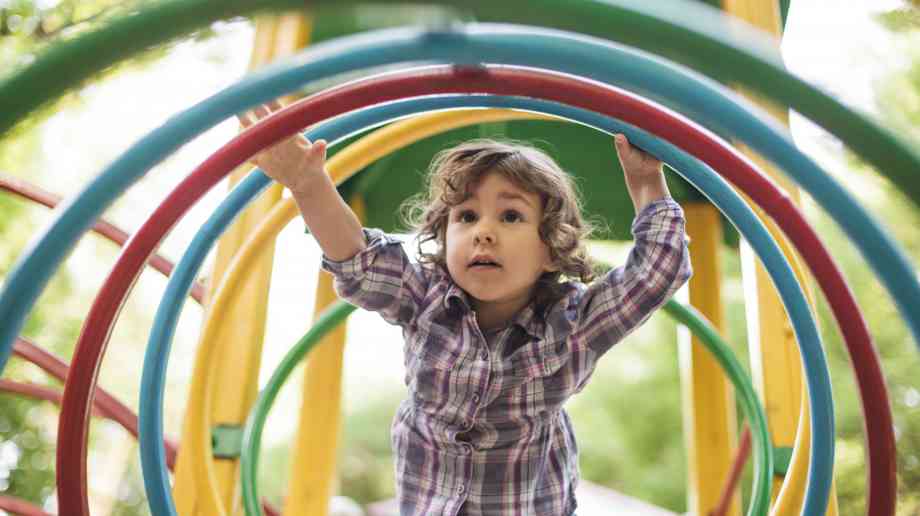
School playgrounds can alleviate a health crisis
Outdoor play facilities that schools provide are an increasingly important tool in tackling children’s inactivity, says Mark Hardy, chair of the Association of Play Industries
The serious threat posed to children’s physical and mental health from sedentary and indoor lifestyles is becoming an ever-more urgent problem to confront. The damage to the health and wellbeing of millions of children means we are facing a public health crisis with repercussions for generations to come.
All aspects of children’s lives are being impacted by, quite simply, a failure to move enough. Everything from obesity to mental health, sleep to social skills, concentration to behaviour – all are being negatively affected by chronic levels of inactivity on a mass scale.
British children are part of a global pandemic of low physical activity, having very poor levels in international terms and, however simple the solution may sound – to get children moving more – it is a complex issue.
Screens and the ‘pull’ indoors
Screen time and the dominance of digital culture is a major contributory factor to the children’s inactivity crisis. Our report A Movement for Movement shows, for the first time, a strong link between recreational screen time and children’s inactivity.
Children are experiencing a strong inducement from screens to stay indoors and are choosing to spend their leisure time on screens instead of playing outside. Where once they played outside after school with their friends, the default setting for so many children now is to retreat to their rooms alone with their phone, tablet or laptop, often for hours on end.
We commissioned a survey of over 1,100 parents through leading parenting website Mumsnet and found that 49 per cent of parents agreed that their child prefers screen time over other activities.
Fourty-three per cent expressed concern about the amount of time their child spends on screens and 48 per cent said they find it difficult to persuade their child to leave their screen.
What’s more, 60 per cent of parents with a child aged 10-12 find it difficult to persuade their child to leave their screen, and 57 per cent of those with a child aged 10-12 expressed concern about the amount of time their child spends on screens.
Parents of children aged 8-12 were significantly more likely than parents of younger children to say their child prefers screen time over other activities.
Seven in 10 parents with a child under four said their child preferred spending time outdoors to screen time. However, less than a quarter of parents with a child aged 10-12 agreed with this statement.
Dwindling play provision
In addition to the pull indoors from screens, there appears to be no let-up in the alarming rate at which public playgrounds are closing or being neglected. Despite repeated government claims that they are tackling childhood obesity and mental health problems, our research continues to show that there is dwindling investment in public outdoor play:
By 2020/21 there will have been a decrease in spend on play facilities of 44 per cent since 2017/18.
In 2016/17 local authorities closed 63 playgrounds and in 2017/18 a further 70 playgrounds have been closed.
Since 2014 local authorities have closed a total of 347 playgrounds across England.
There will be a decrease in spend on playgrounds of over £13m each year on average across England.
Local authorities estimate a decrease in their spending on playgrounds of £25m by 2021.
What do parents think?
Children are two to three times more physically active when outdoors than when indoors: they move more, sit less and play for longer. Evidence points to the fact that playgrounds fulfil a unique role in improving children’s levels of physical activity, social interaction, fitness and physical and mental health.
The vast majority of families live in urban areas where community playgrounds often represent the only chance for children to play outdoors, particularly in deprived areas.
Our Mumsnet survey showed that playgrounds matter to parents and closures impact the amount of activity their children engage in. Sixty-one of parents with access to a local, easily accessible and safe playground said that it makes their child play outside more.
Nine in ten parents without access to a local playground said that having access would make their child play outside more, and over half (53 per cent) said their child would be more active if they had more access to local play facilities
Schools and Play
As the number of play spaces in the community declines and children spend their free time on screens, it is incumbent on schools to go some way to plugging the gap in free outdoor play provision.
Outdoor play is associated with better social skills in preschool children, and those aged 7 -14 spending more time outdoors are found to be less likely to have peer relationship problems and have better psychosocial health.
As such, the play opportunities that school playgrounds provide have a pivotal role in alleviating the crisis in children’s health. Play is absolutely fundamental to children’s healthy physical and mental development.
Free, unsupervised play, where children develop their own games and rules, helps them to develop their creativity, imagination and problem-solving skills. Play also improves a child’s ability to focus and concentrate as well as to learn vital social skills. The calculated risks that children naturally take in free play enables them to develop resilience and builds confidence in their own judgement and abilities.
In addition, incorporating this kind of physical activity into the school day has a positive effect on pupils’ behaviour and their ability to focus for longer periods of time.
Take your school to new heights
With one in three children overweight or obese by year 6 and child mental health problems at record levels, high-quality outdoor play equipment in schools is now more important than ever.
Our Mumsnet survey showed that playgrounds matter to parents and that includes those in the school environment; sixty-six per cent of parents said that outdoor play facilities are important when choosing their child’s school and almost one third said they rely on school playgrounds to get their children active
School playgrounds help to give children a lifelong love of play and movement so it is vital that you get the right support, advice and expertise. Choosing an Association of Play Industries member will ensure your play areas are the rich and stimulating outdoor learning environment your pupils deserve.
Backed by the API’s Professional Code of Conduct, API members operate to the highest standards. They will provide evidence of previous work and references and the API Charter ensures they design exceptional, high-quality, innovative play spaces for children of all ages and abilities.
Support from start to finish
Our members will visit your school and, where appropriate, meet the decision-making team. Once work is complete, post-installation inspection and maintenance services will be offered to ensure the safety of your facilities for years to come: API members will want to know how your new facilities have impacted your school.
Latest News
31/10/2025 - 10:12
A growing number of UK children are now eligible for Free School Meals (FSM), yet most still aren’t taking advantage of them on a daily basis, new research reveals.
30/10/2025 - 01:28
In the wake of the Raac crisis, the DfE spent £5 million on research into the condition of school buildings, which is due to conclude in spring 2026.
30/10/2025 - 01:09
Malmesbury Primary School in Wiltshire has submitted plans for a major expansion, funded by entrepreneur James Dyson.
30/10/2025 - 00:55
Monday's Every Pair Tells a Story campaign to protest to highlight the national crisis in SEND provision.
29/10/2025 - 09:19
Estimated data from the Department for Education reveals that 470,000 pupils under 16s use local authority funded transport to get to school.







